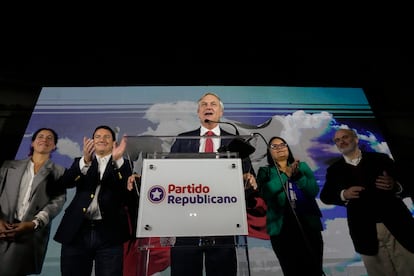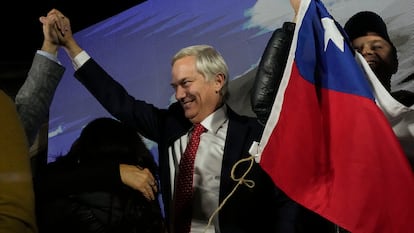Explaining the rise of the far-right Republican Party in Chile
The right-wing formation led by José Antonio Kast garnered the highest number votes, since the country’s return to democracy in 1990 with 35%, turning the political chessboard around


The far-right Republican Party (PLR) became the main political force in Chile after Sunday’s Constitutional Council elections, just 15 months after the leftist government of President Gabriel Boric assumed power. In just four years since its foundation in 2019, the PLR has propelled its leader, José Antonio Kast, to winning the first round of the presidential elections in 2021, although he eventually lost to Boric in the runoff, and to a historic triumph in Sunday’s ballot, where he garnered 3,468,258 votes for his candidates in the election to choose the 50 members of the Constitutional Council. With 35.5% of the vote, the PLR secured a total of 23 seats on the body that will be tasked with drafting a new Constitution for Chile, which will be submitted for a referendum in December. It is a panorama that, if fully taken advantage of, could pave the way for Kast to make further gains in the 2024 regional elections and place him as the front-runner for the 2025 presidential and parliamentary ballot.
There is no single determining factor to explain how such a young political party — one that is strongly conservative on matters such as same-sex marriage and abortion and that has been openly against the need to draft a new Constitution — managed to turn the Chilean political chessboard which, after the social outburst of 2019, had been heavily weighted to the left, in its favor. With almost half of the Constitutional Council under its control — in addition to the 11 seats gained by the traditional right — Kast’s formation can propose, approve, and modify constitutional norms as the right-wing bloc on the council comfortably exceeds the 30 seats necessary to do so. With 34 seats, representing two thirds of the body, the right-wing parties —which have fundamental differences, chief among which is the commitment to replace the current Constitution, enshrined during the dictatorship of Augusto Pinochet in 1980 — have nevertheless swept the board.
The PLR has 20,980 members, 70% of whom are men, and its supporters are mostly aged between 45 and 54 and identify as religious, whether they be Catholics, Evangelicals or Protestants. This is underlined in a study carried out by the Universidad Diego Portales and led by Cristóbal Rovira, a PhD in political science at the Humboldt University of Berlin. Rovira’s research, entitled “Support and rejection of the ultra-right in Chile” also investigates the PLR support base’s vision of feminism and highlights a conservative stance regarding the role of women. One of the study’s conclusions reads: “The empirical evidence reveals that those who support the ultra-right in Chile adopt anti-feminist and conservative positions regarding the role of women, while those who reject the ultra-right share, in a broad sense, demands in favor of greater gender equity.”
According to this study, published in 2022, the PLR’s rise has been driven by the substitution of the binominal electoral system by a proportional model and by the programmatical moderation of the traditional right-wing parties. “Existing research qualifies Kast and the Republican Party as a project that is positioned to the right of the conventional right and that has not only similarities, but also contacts, with the ultra-right at a global level,” the research states.
As the PLR is such a new force in Chilean politics, there is no consensus on how to define it. Rovira calls it ultra-right, a concept he justifies in his study. The Republican Party itself, however, does not consider itself an extreme right formation, as Kast said several times during the 2021 presidential campaign: “They say I am extreme. Extreme in what sense? In loving the Homeland. In loving the Nation and patriotic symbols. In defending my friends. In protecting the entrepreneur. In what way am I extreme?”
In a Twitter forum held by EL PAÍS a few hours after the elections to analyze the results, analysts Alfredo Joignant and Claudio Alvarado discussed this distinction. “I don’t know of any party of the new radical right that accepts being described as extreme right, and even less so as a far-right party,” said Joignant, who prefers the concept of the radical right because the Republican Party “has the capacity to take a position on a series of issues in a categorical manner, without euphemisms and unambiguously, which will gradually penetrate a frustrated, angry and affected electorate.” In 2017, in his first presidential campaign, Kast defended the figure of Pinochet. “If he were alive, he would vote for me,” he said at the time.
In Alvarado’s view, the PLR “is a conservative right-wing” and it remains to be seen if they position themselves on a radical footing on a permanent basis or if their more institutional aspects will predominate, “the ones that seem to be embodied by both the general secretary, Arturo Squella, and Luis Silva, who was the councilor who received the highest number of endorsements on Sunday.”

Javier Sajuria, associate professor at the School of Politics and International Relations at Queen Mary University of London, recently analyzed the causes behind the PLR’s rise and stated it would be simplistic and mistaken to assume that the party’s voters are uninformed. In a thread posted on Twitter, the academic explained that several studies have shown that “those who vote for populist options are neither less informed nor less interested in politics than those who seek non-populist alternatives. Furthermore, they tend to have a high appreciation for democracy, but also a growing unease with how it functions.”
According to Joignant, the PLR has ridden a perfect storm in which concern over public security, an economic crisis causing inflationary effects, a migratory emergency in northern Chile and a scenario of intermittent violence in the south between the indigenous Mapuche and the government, converged to hand the highest proportion of the vote to the party whose main campaign banners were precisely these issues. In his opinion, the PLR managed to “capitalize on discontent in the face of a government that has been hesitant to tackle these four simultaneous crises.”
One of the main unknowns after Sunday’s elections is what role that the Republican Party will play on the Constitutional Council. Center for Public Studies researcher Aldo Mascareño told EL PAÍS that the result obliges Kast to oversee a successful constitutional process. “A new constitutional project rejected in the December plebiscite would hit him directly,” said the sociologist. In that scenario, the formation has two options: either it adheres to the structural transformations that are in the 12 constitutional bases included in the Agreement for Chile, which must be included in any new constitutional draft and which the PLR did not support, or it adopts a more open attitude to dialogue.
In the view of former spokesman for the second government of Sebastián Piñera (2018-2022), Jaime Bellolio, the power that the Republicans will hold in the new Constitutional Council will also come with great responsibility for what will happen in this second stage of the process. A member of the UDI, one of the three traditional right-wing parties, Bellolio sees two alternatives. Among the PLR councilors “there is a group who insist on the idea that if this second opportunity is rejected, the constitutional problem is then over, which I believe is a profound error. Then there is another, more pragmatic group, that is saying: ‘I might not like it, but since we are here, let’s close the cycle.’” According to Bellolio, both Kast’s speech and that of Silva on Sunday night suggest the second option has prevailed.
Bellolio, however, questions whether the Republicans will be able to maintain this pragmatic discourse in the Constitutional Council once they assume their functions and have their own autonomy: “This has not happened in Congress, where they have not been able to organize themselves,” he notes.
Sign up for our weekly newsletter to get more English-language news coverage from EL PAÍS USA Edition
Tu suscripción se está usando en otro dispositivo
¿Quieres añadir otro usuario a tu suscripción?
Si continúas leyendo en este dispositivo, no se podrá leer en el otro.
FlechaTu suscripción se está usando en otro dispositivo y solo puedes acceder a EL PAÍS desde un dispositivo a la vez.
Si quieres compartir tu cuenta, cambia tu suscripción a la modalidad Premium, así podrás añadir otro usuario. Cada uno accederá con su propia cuenta de email, lo que os permitirá personalizar vuestra experiencia en EL PAÍS.
¿Tienes una suscripción de empresa? Accede aquí para contratar más cuentas.
En el caso de no saber quién está usando tu cuenta, te recomendamos cambiar tu contraseña aquí.
Si decides continuar compartiendo tu cuenta, este mensaje se mostrará en tu dispositivo y en el de la otra persona que está usando tu cuenta de forma indefinida, afectando a tu experiencia de lectura. Puedes consultar aquí los términos y condiciones de la suscripción digital.








































